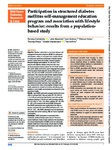Participation in structured diabetes mellitus self-management education program and association with lifestyle behavior: results from a population-based study
Carmienke, Solveig
Baumert, Jens
Gabrys, Lars
Heise, Marcus
Frese, Thomas
Heidemann, Christin
Fink, Astrid
Objective Whether participation in structured diabetes self-management education programs (DSME) for participants with diabetes mellitus is associated with a healthy lifestyle in routine care apart from randomized-controlled studies remains unclear and is this studies’ research question.
Research design and methods We identified 1300 persons with diabetes mellitus drawn from the cross-sectional population-based analysis German Health Update 2014/2015 (GEDA 2014/2015), which integrated the modules of the European Health Interview Survey (EHIS) wave 2. Of those, 816 were ever-DSME participants and 484 never-participants. We conducted multivariable weighted logistic regression analyses for lifestyle differences comparing ever-DSME and never-DSME participants. Lifestyle was defined by physical activity (PA), current smoking, fruit/vegetable consumption and body mass index (BMI). Age, sex, socioeconomic status, living together, limitation due to health problems for at least for 6 months, self-efficacy and attention to one’s health were included as confounders in the regression models.
Results Ever-DSME participants engaged significantly more often in cycling at least 1 day per week (OR 1.62, 95% CI: 1.15–2.30) and performed significantly more often aerobic endurance training of 150 min per week (including walking: OR 1.42, 95% CI: 1.03–1.94, without walking: OR 1.48, 95% CI: 1.08–2.03) compared with never-DSME participants. Ever-DSME participants were significantly more often ex-smoker compared with never-DSME participants (OR 1.39, 95% CI: 1.03–1.88). DSME attendance was not significantly associated with current smoking, BMI and fruit or vegetable consumption.
Conclusion DSME participation is associated with a moderately healthier lifestyle particularly for PA even in routine healthcare. Study results emphasize the importance of a broadly dissemination of DSME access for nationwide diabetes healthcare. Future studies should adjust for DSME participation when investigating lifestyle in persons with diabetes.

